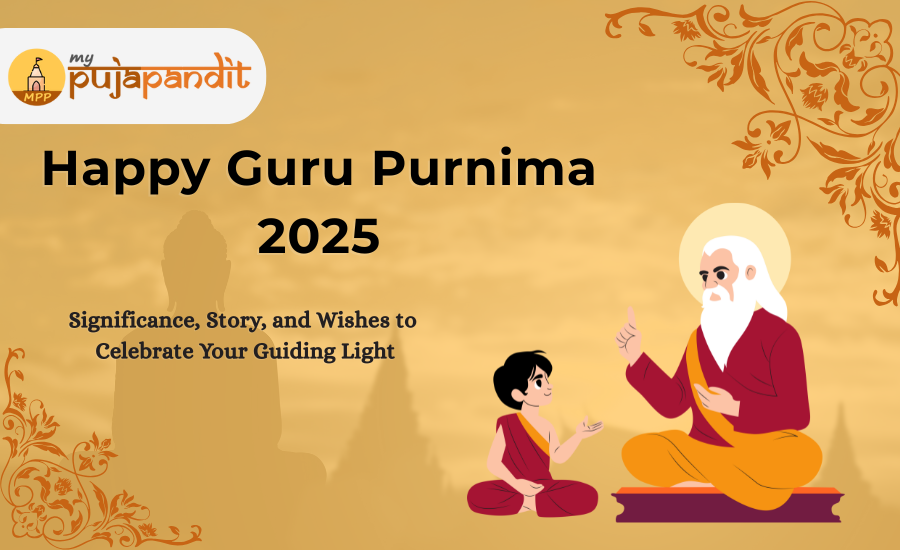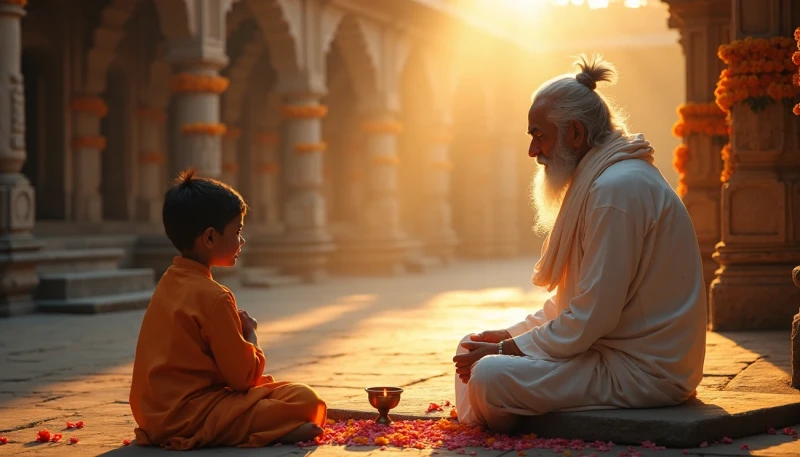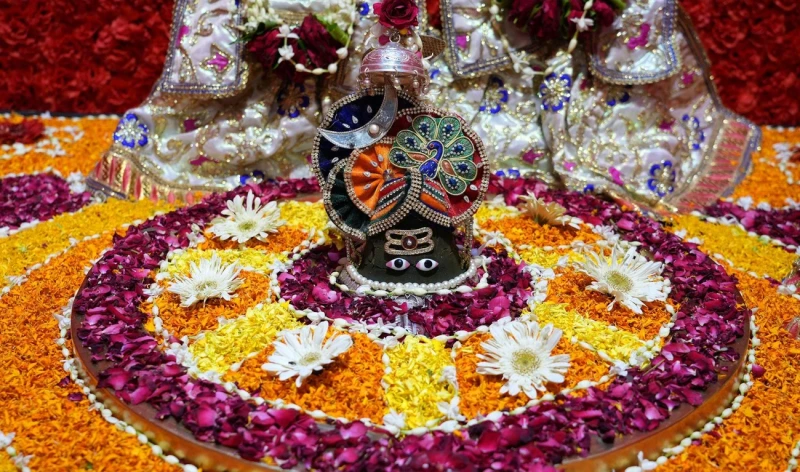
Happy Guru Purnima 2025: Significance, Story, and Wishes to Celebrate Your Guiding Light
Guru Purnima 2025 is a day to cherish the deep connection between teachers and students, celebrating those who dispel darkness from our lives. The term "guru" itself tells us this beautiful thing – in Sanskrit, "gu" is darkness and "ru" is removal.
As we prepare to mark this sacred day, it's worth taking a step beyond the rituals and really knowing what Guru Purnima is all about. Beyond a celebratory holiday, Guru Purnima is a grateful expression of our devotion to the beacons in our lives—our Gurus. Seen on the first day of the full moon in the Hindu month of Ashadha (which occurs in July), this day also celebrates the birth anniversary of the great sage Sage Vyasa who wrote the epic Mahabharata and the author of the Vedas. His work for spiritual knowledge is so deep that this day is also referred to as Vyasa Purnima. This day is not just significant for Hinduism but is also celebrated by Buddhists and Jains, reflecting its pan-cultural significance. Traditional practices involved performing Guru Puja, reading scriptures, and giving presents to teachers. By these practices, we encourage a learning culture of respect and gratitude among students and children.

The Significance of Guru Purnima
The importance of Guru Purnima extends beyond a casual celebration. Essentially, this sacred day symbolizes the arrival of the very first guru. As per yogic lore, it celebrates when Lord Shiva evolved from Adiyogi (the initial yogi) to the Adi Guru (the initial teacher) by starting the imparting of yogic science to the Saptarishis or seven sages.
This planetary alignment is particularly powerful. On this full moon day, there is some synergy between the Moon and planets, which generates increased receptivity in human beings to the guru realm. This heavenly timing makes this the most auspicious time to accept grace and wisdom.
Guru Purnima is not merely a festival—it's a celebration of wisdom, learning, and the sacred guru-shishya parampara or tradition. In Hinduism, Sage Vyasa is celebrated on this day as the great rishi who collected the Vedas, wrote the epic Mahabharata, and influenced most of Hindu philosophy and literature. Guru Purnima is observed as the birth anniversary of Sage Vyasa and also as Vyasa Purnima. It perfectly captures the essence of the guru-shishya parampara—the eternal teacher-disciple tradition.
In Buddhism, the day is celebrated as Dharmachakra Pravartana Diwas—the day Lord Buddha gave his first sermon at Sarnath after becoming enlightened. It marked the start of his teachings, where he explained the Four Noble Truths, initiating the spiritual wheel of Dharma.
For Jains, Guru Purnima is the occasion when Lord Mahavira picked Gautama Swami as his very first disciple and established the guru-disciple bond in Jainism.
It's a poignant reminder of the position of a guru in guiding a soul towards moksha.
The day holds deep cultural significance across religions. In Nepal, it's observed as Teacher's Day. For scholars, it's a day to thank the past and present teachers for imparting knowledge from generation to generation.
Traditional customs are:
Waking up early and taking blessings from seniors
Giving puja (ritual worship) to gurus
Offering gurudakshina (offering) as a token of respect
Chanting the divine mantra: "Gurur Brahmā Gurur Viṣṇur Gurur devo Maheśvaraḥ"
In effect, Guru Purnima serves to remind us that even an "utterly heartless ascetic" like Shiva became compassionate enough to impart wisdom, emphasizing the way in which knowledge and compassion co-mingle at the center of this festival.
The Story Behind Guru Purnima

In Hindu tradition, Guru Purnima is celebrated as the birthday of Sage Vyasa, who was born Krishna Dwaipayan to sage Parashara and princess Satyavati. This remarkable child had very deep knowledge about past, present, and future. Throughout his life, Vyasa made monumental contributions to Hindu literature—systematizing and dividing the Vedas into four divisions (Rigveda, Yajurveda, Samaveda, and Atharvaveda) so that they would be easier to access. In addition, he wrote the epic Mahabharata and created 18 Puranas and 108 Upanishads, condensing their essence into the compact Vedanta Sutras. His otherworldly heritage gave this day the secondary name "Vyasa Purnima."
The Buddhist tradition has yet another interesting account. On this day of the full moon, after attaining enlightenment near the Bodhi tree, Buddha preached his inaugural sermon at Sarnath to his five previous associates. This turning point, Dharmachakra Pravartana (the initial turning of the wheel of dharma), presented the Four Noble Truths—cornerstones of Buddhist philosophy. Buddhists therefore celebrate this day with great reverence, usually starting their three-month monastic retreat, Vassa.
Jainism lends another facet to Happy Guru Purnima 2025 celebrations. Jains celebrate Lord Mahavira, the 24th Tirthankara, who received Gautama Swami as his first disciple on this sacred day. This marked the origin of the guru-shishya tradition in Jainism and the advent of Chaturmas, their four-month season of religious discipline.
Yogic lore narrates that Lord Shiva turned into Adi Guru (the first guru) by teaching cosmic wisdom to seven determined seekers after they finished 84 years of penance. These seven took on the role of the Saptarishis, being assigned the task of disseminating this knowledge across humankind.
Wishes and Quotes to Celebrate Your Guiding Light
Gratitude to our gurus is the central theme of Happy Guru Purnima 2025. This traditional practice reminds us to pay tribute to those who light up our way with knowledge and wisdom. I've collected some sincere wishes and deep quotes to assist you in wishing your guiding lights.
Sri Sri Ravi Shankar eloquently describes the nature of this relationship: "Guru is knowledge. Guru is love. Guru is light. There is no difference between Guru, God and the Soul." Sadhguru also brings to mind that "A Guru is not someone who holds a torch for you. He is the torch." These words attest to the power of transformation of a genuine teacher.
For individuals looking for sincere greetings to send, try the following messages of thanks:
"Your wisdom has been my support during trying times. Happy Guru Purnima!"
"On this blessed day, I offer my salutations with respect for your wisdom that directed my life."
"May your teachings continue to light our ways. Happy Guru Purnima!"
In fact, the Sanskrit expression "Mata Pitah Guru Daivam" elevates teachers above even God in the ancient order—mother, father, guru, and God in that order. In India, being a teacher is so much more than just a job—it's a deeply respected calling. Guru Purnima is a heartfelt reminder of the immense gratitude we owe to our mentors, our shapers, and our sources of inspiration.
It goes beyond a simple "thank you." Some people choose to write heartfelt letters, sharing exactly how a Guru has changed their lives. Others show their appreciation by putting into practice the lessons they've learned—because truly applying those teachings is the greatest form of respect.
Albert Einstein once remarked, “It is the supreme art of the teacher to awaken joy in creative expression and knowledge.” On this special day, we’re encouraged to reflect on our own journeys—recognizing how far we’ve come, all thanks to the guiding light of someone special.
As Swami Vivekananda beautifully expressed, "The Guru is the one who, having crossed the path to liberation, shows us the way." Guru Purnima is the perfect occasion to honor those often unsung heroes in our lives—the individuals who help us become who we are truly meant to be.
Conclusion
Guru Purnima is a deep reminder of the power of knowledge in transforming our lives. Through ages, this festival has crossed religious lines, bringing Hindus, Buddhists, and Jains together in thanking those who vanquish darkness with wisdom. Whether we commemorate the literary work of Sage Vyasa, Buddha's first sermon, or Mahavira's acceptance of his first disciple, the mood remains the same – thanks to guidance.
After all, educators form not only our intellects but also our character. Their impact goes far beyond books or formal schooling. Most of us have particular moments in mind when a teacher's words shifted our outlook or enabled us to overcome challenges. This unique bond merits greater notice than a single day, though Guru Purnima provides us with a special time to say thank you.
Indeed, the most significant celebration does not result from fussy rituals but from genuine thanksgiving. Small deeds like penning a sincere letter, living up to their teachings, or presenting a small token of appreciation can significantly reverence our guides. These acts are a recognition of the boundless debt we incur from those who light our way.
As we celebrate Happy Guru Purnima 2025, we should recall that becoming worthy disciples is the highest homage to our gurus. Applying their teachings in our daily lives is a more sacred offering than any ritual gift. The guru-shishya parampara teaches us that knowledge transmitted from generation to generation is the foundation of civilization itself.
Thus, this Guru Purnima, let us pay homage with respect to all who lead us – parents, teachers, mentors, and spiritual guides. Their radiance still glows in our deeds, forming an unbroken succession of wisdom that goes from times immemorial to our time yet to be. This festival, in essence, teaches us that we never tread alone on the path to growth and insight.

